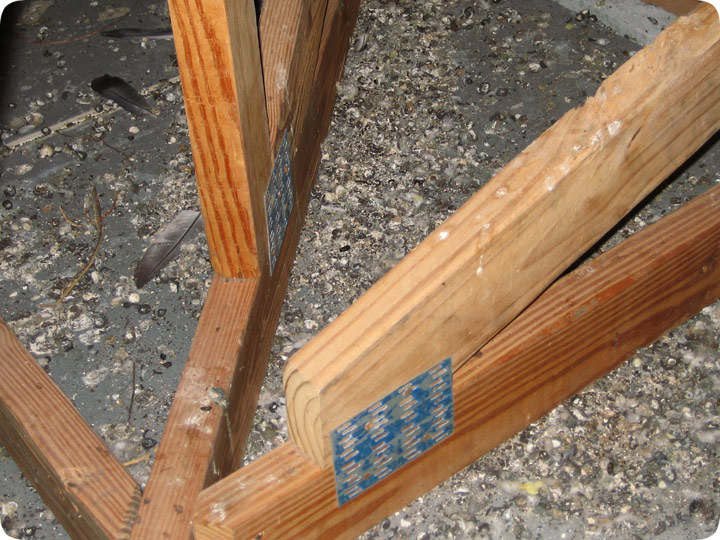-
info@aaanimalcontrol.com
Call us for help in your town
Humane Wildlife Education
Pigeon Poop - Droppings & Waste in Attic

09.19.2007 - I did a pigeon removal project at this residential house. The homeowner heard noises in the attic. At first he thought that he was hearing
rodents, such as rats or squirrels. However, one look at the evidence shown above, and I knew that I was dealing with a pigeon infestation. Pigeons love to
live in attics, just like other wild animals such as raccoons or mice. And just like any animal that lives in an attic, they leave their waste behind. In the
above photo, we see some of the remnants of the pigeon presence - the pigeon poop.
As with any wildlife job, first I removed all of the animals - in this case,
I excluded the pigeons and got them all out with one-way removal devices. Once I got them all out, I sealed off all of the open holes in the architecture that
allowed the pigeons to get inside in the first place. The final step was to clean out the pigeon poo. However, the homeowner was a cheap man, and did not want
to pay for professional attic cleaning and decontamination. He declined, despite my warnings about the dangers of pigeon related
diseases.
However, when he and his wife later became ill with a mysterious lung infection, diagnosed as histoplasmosis, he called me back for a professional
attic cleaning. I'd wore a respirator that can filter particles as small as 0.3
microns and wear a disposable biohazard suit with gloves. During the cleanup, I sealed heating and cooling air ducts and shut the system down. I
vacuumed out the main bulk of droppings, but first I moistened the droppings with a disinfectant to keep spores from becoming airborne and keep them wet. I kept
the vacuum outside, and ran a house out of the attic and to the contractor vacuum. All
the poop and nesting material was stored in sealed plastic garbage bags 3 mil thick, and when finished and while still wearing the respirator, I removed
the biohazard suit and placed it in the plastic bag. Before I was done, I fogged the entire attic with a special enzyme-based decontaminant that killed off any
remaining biohazards, such as fungus or bacteria, and made sure the attic was 100% decontaminated.
If you have pigeon waste, such as nesting material, pigeon urine, or pigeon excrement in your attic, it's important that you have the area thoroughly cleaned.
Do it yourself: Visit my How To Get Rid of Pigeons page for tips and advice.
Get professional help: Visit my Nationwide Pro Directory of wildlife removal experts.
For more wildlife stories, click my Wildlife Blog
or click my below banner to hire a local trapper.
It's not news that pigeons don't make the best housemates. Dealing with a pigeon infestation can be a real struggle, especially when the birds make their way inside of your house and nest in your attic. Not only do they cause a lot of noise but they leave an incredible mess behind, which means that you still have tons of work to do even after getting rid of them. Cleaning areas of bird feces is not as simple as it may sound, and one should be always prepared for such a task or decide to contact a professional to take care of it.
Where do pigeons nest and roost?
In this case, when we talk about interior parts of a house or commercial building, we usually mean the roof and the attic. Pigeons tend to use roof voids to nest and roost, but if they can find small gaps and holes, they will nest inside the building. Pigeons are drawn to such spaces because they are dry and offer safe areas to breed. Moreover, the human presence is rare and there are usually no other animals in such spaces. In residential properties, birds often use loose roof tiles to access the roof void.
Are pigeon droppings dangerous?
Accumulated pigeon feces have not only a very bad odor but are also very encouraging for parasites and insects. Messy spaces filled with bird droppings are also a perfect environment for different pests such as cockroaches or mice. What is more, pigeon droppings can contaminate food and water supplies and pose a serious health risk to you and your family. Harmful pathogens can spread throughout the whole house, for example, if the air conditioning system is connected to the contaminated attic.
Pigeons are known as carriers of various diseases and can spread them in various ways. This means they can spread diseases not only by being in contact with food or water that we are consuming, but also indirectly – through their droppings. Once their feces dry out, the spores become airborne and can be inhaled or can enter vents and spread across the whole building.
Cleaning pigeon droppings in your attic
When you decide to clean the bird feces from your attic or any other space in your house, you need to remember to take all the necessary precautions first. As we mentioned before, you can get infected with a disease by breathing contaminated air near the accumulated droppings, which means a face mask that covers your nose and mouth is a must. You should also wear disposable gloves and long-sleeved clothing so that you minimalize the risk of getting your skin in contact with the feces.
We recommend starting the cleaning process by sprinkling some water on the droppings. This way you will prevent the creation of the dust that could easily be spread. You should scrub and wash the droppings with a solution of at least one-part bleach and ten-parts water. In the end, remember to throw away the droppings and other gathered material in a sealed trash bag.




















